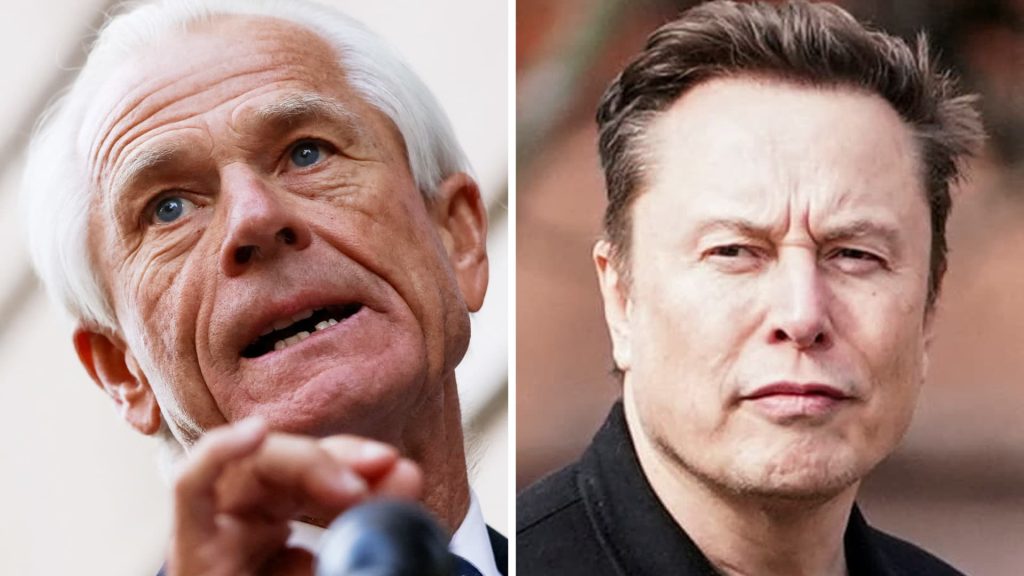In a recent media appearance, top White House trade adviser Peter Navarro downplayed reports of tensions with tech mogul and fellow Trump adviser Elon Musk following critical comments Musk made about Navarro. Despite Musk’s remarks referring to Navarro as a “moron,” Navarro insisted that there were no issues between them, citing a mutual understanding on various economic policies. The discussion touches upon significant topics such as trade tariffs and manufacturing in the United States, revealing some contrasting views among top officials in the Trump administration.
| Article Subheadings |
|---|
| 1) Peter Navarro’s Assurance of Friendship |
| 2) The Context Behind the Tensions |
| 3) Navarro’s Stance on Tariffs and Manufacturing |
| 4) Musk’s Call for Zero Tariffs |
| 5) Conclusion on Administration Dynamics |
Peter Navarro’s Assurance of Friendship
During a segment on NBC News’ “Meet the Press,” Peter Navarro responded to speculation regarding a rift between him and Elon Musk. The exchange began following Musk’s outspoken comments on social media, where he labeled Navarro a “moron” amidst discussions on trade policies affected by Trump’s tariffs. Despite this, Navarro remained upbeat, expressing, “Everything’s fine with Elon,” and joking about the insults he has faced throughout his career. This highlights Navarro’s intention to emphasize cooperation despite public disagreements, an approach that may resonate within the current administration’s tumultuous dynamics.
The Context Behind the Tensions
The underlying issues that ignited the reported tensions stem from differing opinions on trade and manufacturing standards within the Trump administration. After a recent interview with CNBC, where Navarro pointed out Musk’s status as a car assembler rather than a full-fledged manufacturer, Musk responded with scathing remarks. Navarro noted that while Tesla does manufacture vehicles, the reliance on imported parts makes their production strategy different from traditional manufacturing roles, which, in Navarro’s view, should primarily source all components domestically. This clash underscores existing debates about American manufacturing practices and the broader implications of tariffs in global trade.
Navarro’s Stance on Tariffs and Manufacturing
Navarro is an ardent supporter of President Trump’s trade policies, particularly the imposition of tariffs aimed at reviving American manufacturing. He articulated his concerns about the current state of U.S. manufacturing during the interview, claiming that it is crucial to create jobs in American cities such as Akron, Indianapolis, Flint, and Saginaw. In his discussion, Navarro reinforced that these tariffs are not just a means to control imports but are also part of a broader strategy to support domestic job growth and manufacturing prowess. By addressing the differences with Musk directly, Navarro implicitly positioned his views as more aligned with Trump’s aggressive trade agenda.
Musk’s Call for Zero Tariffs
In stark contrast to Navarro, Elon Musk has voiced a desire for “zero tariffs” between the U.S. and Europe. Musk’s comments reflect a more globalized view of trade, suggesting that tariff reductions could enhance trade relations and benefit American consumers and industries. This open call for reduced tariffs emerged shortly after the announcement of President Trump’s steep tariffs, suggesting that Musk’s business philosophy prioritizes accessibility and competition over protectionist measures. The juxtaposition of Navarro and Musk’s perspectives underscores the complexities of trade policy within the Trump administration, revealing a divide between traditional manufacturing advocates and modern tech-driven market approaches.
Conclusion on Administration Dynamics
The dialogue between Navarro and Musk illustrates the multifaceted discussions occurring within the upper echelons of the Trump administration concerning economic policy. As the administration navigates trade negotiations and seeks to implement a policy that balances domestic manufacturing with international trade relationships, varying perspectives like those of Navarro and Musk become increasingly significant. Navarro’s defense of tariffs, aligned with Trump’s wishes, versus Musk’s appeals for lower trade barriers highlights the ongoing balancing act that officials must maintain as they shape policies that strive to cater to different sectors of the economy.
| No. | Key Points |
|---|---|
| 1 | Peter Navarro dismisses tensions with Elon Musk, despite critical remarks made by Musk. |
| 2 | Differences in opinion on manufacturing and tariffs highlight conflicts within the Trump administration. |
| 3 | Navarro emphasizes the importance of domestic manufacturing while Musk advocates for reduced tariffs. |
| 4 | The discussions reflect broader economic policies affecting trade and manufacturing across America. |
| 5 | The ongoing dialogue underscores the complexity of shaping effective trade policies within the administration. |
Summary
The recent exchange between Peter Navarro and Elon Musk underscores the contrasting views within the Trump administration regarding trade policies and manufacturing ideologies. While Navarro defends a stringent approach aimed at boosting American manufacturing through tariffs, Musk calls for a more progressive perspective focused on reducing trade barriers. This divergence reflects the challenges faced by the administration as it seeks policies that resonate with various economic sectors, signifying a pivotal moment in U.S. trade discussions that could shape future economic landscapes.
Frequently Asked Questions
Question: What role does Peter Navarro play in the Trump administration?
Peter Navarro serves as a top trade adviser, focusing on trade policies that promote American manufacturing and economic interests.
Question: Why did Elon Musk criticize Peter Navarro?
Elon Musk criticized Peter Navarro after Navarro’s comments suggested that Musk was not a traditional car manufacturer but rather a car assembler reliant on imported parts.
Question: What is the significance of the contrasting views on tariffs in the Trump administration?
The differing views on tariffs within the Trump administration highlight the complexities of U.S. trade relations and the ongoing debate on how best to support domestic manufacturing while also fostering beneficial international trade agreements.
